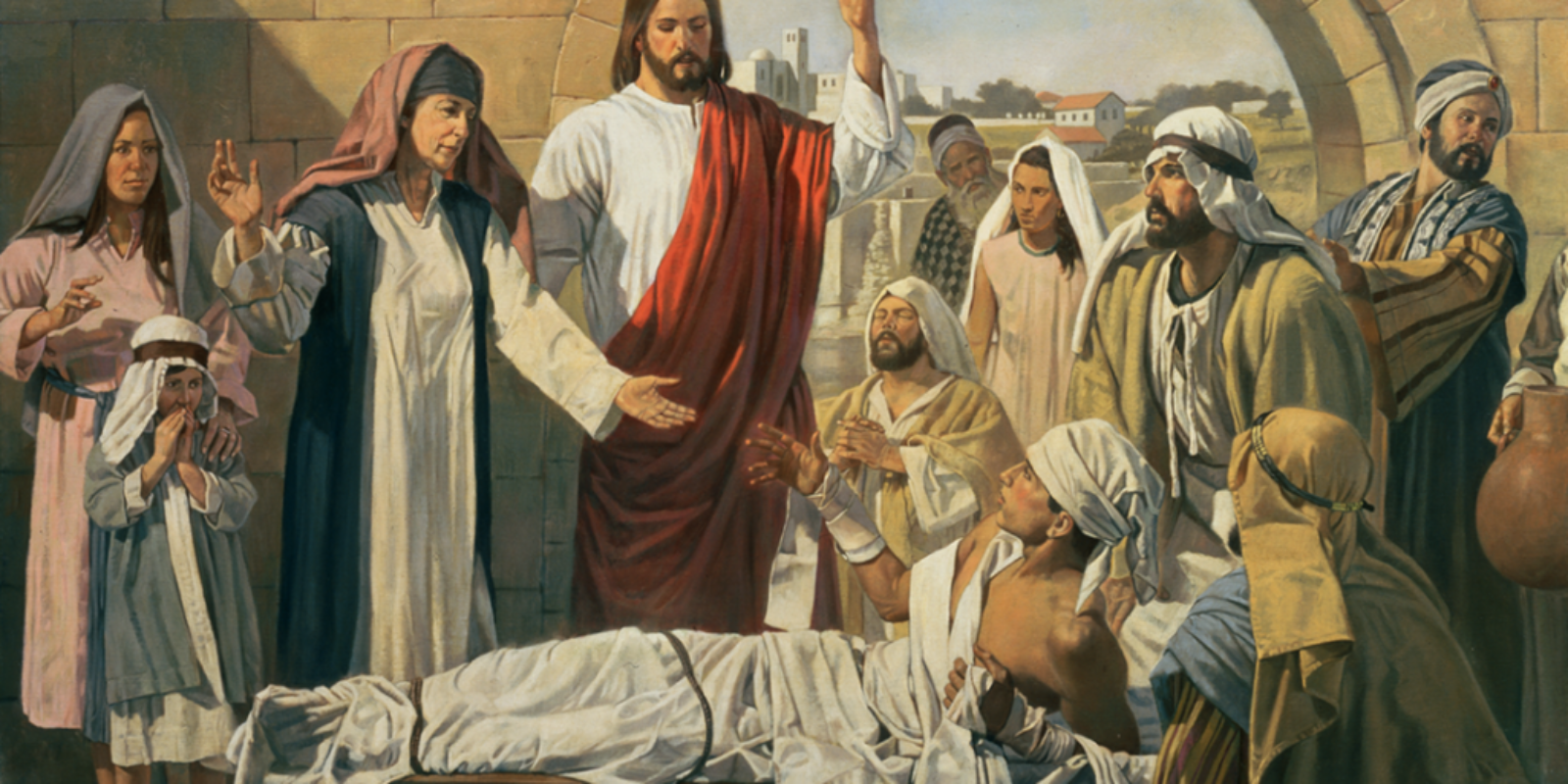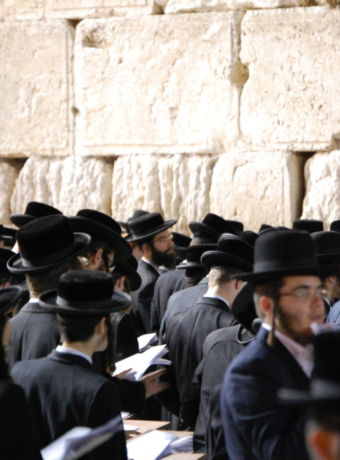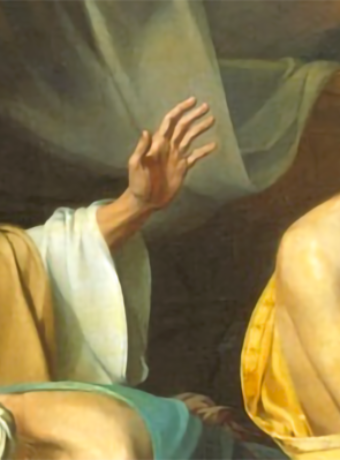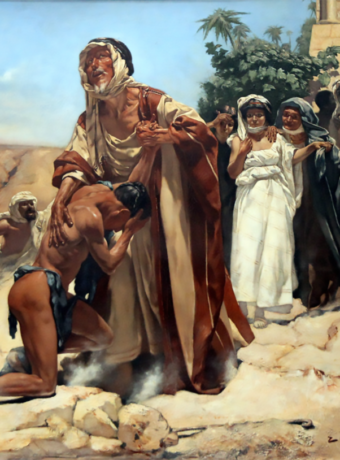In Adam, All Die, Even so, in Christ Shall All Be Made Alive
God identifies us all in two persons, you are either in Adam or in Christ, to which one do you belong?
This is the sixth part of a series of articles on the Messiah’s names Jesus and Immanuel. Why was Christ given these two distinct names and what do they really mean to us? You can read the first, second, third, fourth, and fifth articles if you haven’t as background to this story.
Oneness in Identity
Genesis chapter 5 tells of the generations of Adam. In the day when God created man, He made him in the likeness of God. He created them male and female. He blessed them and called them Adam (or Mankind) in the day when they were created.
In the first man’s identity, Adam, God considered the whole of mankind as one person. All that came out of the first man, their physical offsprings (which includes you and me) are in a single identity we call Mankind. This is the realm of Adam.
The apostle Paul explains this oneness in identity in his epistles to the Romans (Romans 5:12). He stated that when the first Adam gave in to the serpent’s temptation and disobeyed God’s command in the garden sin came into the world (referring to mankind).
Then through sin, death spread to all mankind. All have sinned and death reigned even over all that was in Adam, his future offspring (Romans 5:14). The punishment for sin which is death then awaits all mankind. Mankind entered the realm of Satan.
12 Therefore as sin came into the world through one man and death through sin, so death has spread to all men because all have sinned. 13 For until the law, sin was in the world. But sin is not counted (imputed) when there is no law. 14 Nevertheless, death reigned from Adam to Moses, even over those who had not sinned in the likeness of Adam’s sin, who was a type of Him who was to come. (Romans 5:12–14, MEV)
(Verse 13 above is a parenthesis that needs further exposition with regard to sin and the law. But I must take it up separately in another article).
The writer of the epistle to the Hebrews further alludes to this parental identity in explaining the superiority of Christ’s eternal priesthood (in the order of Melchizedek–Psalms 110:4) over that of the Levite’s earthly priesthood.
4 Now consider how great this man (referring to Melchizedek) was, to whom even the patriarch Abraham gave a tenth of the spoils. 5 Surely the sons of Levi, who receive the office of the priesthood, have a command to take tithes of the people according to the law, that is, from their brothers, though they also come from the seed of Abraham. 6 But this man, whose descent is not numbered among them, received tithes from Abraham and blessed him who had the promises. (Hebrews 7:4–6, MEV)
Then in verses 9–10, the writer says that Levi, who receives tithes (from the people), paid tithes (to Melchizedek) through Abraham, for he (Levi) was still in the loins of his father (Abraham) when Abraham gave tithes to Melchizedek, “the priest of the Most High God” (Genesis 14:18).
In the same principle, the apostle in Romans 5:14 pointed us to the coming Messiah Yahoshua (Jesus), the Son of God who did come in the likeness of Adam. He took the form of the sinful flesh and died in our stead. By shedding His unblemished blood, Jesus redeemed mankind clearing them from their sins.
However, although redemption was made available to all mankind it can only be imputed when one believes in the Son of God.
A believer is then identified through baptism, with the Son of God. He has been delivered from the power of darkness and is transferred into the kingdom of God’s dear Son, in whom we have redemption through His blood, the forgiveness of sins (Colossians 1:13). This is the realm of Christ, in His name Jesus.
In John chapter three, we read of a Pharisee named Nicodemus, who came to Jesus one night to inquire believing that He was a teacher sent from God.
5 Jesus answered, “Truly, truly I say to you, unless a man is born of water and the Spirit, he cannot enter the kingdom of God. 6 That which is born of the flesh is flesh, and that which is born of the Spirit is spirit. 7 Do not marvel that I said to you, ‘You must be born again.’ (John 3:5–7, MEV)
Jesus then explained how can this be.
14 Just as Moses lifted up the serpent in the wilderness, even so must the Son of Man be lifted up, 15 that whoever believes in Him should not perish, but may have eternal life. (John 3:14–15)
“For God so loved the world that He gave His only begotten Son, that whoever believes in Him should not perish, but have eternal life. For God did not send His Son into the world to condemn the world, but that the world through Him might be saved. (John 3:16–17)
18 He who believes in Him is not condemned. But he who does not believe is condemned already, because he has not believed in the name of the only begotten Son of God. (John 3:14–18, MEV)
In His discourse with the Jews, Jesus emphasized these two identities when He said to them, “You are from below; I am from above. You are of this world; I am not of this world. Therefore I said to you that you will die in your sins. For unless you believe that I am He (Christ, the Son of God), you will die in your sins” (John 8:23–24).
Two destinies, eternal life or eternal death await these two identities
18 Therefore just as through the trespass of one man came condemnation for all men, so through the righteous act of One came justification of life for all men. 19 For just as through one man’s disobedience the many were made sinners, so by the obedience of One the many will be made righteous. (Romans 5:18–19, MEV)
21 For since by man (Adam) came death, by man (Jesus Christ) came also the resurrection of the dead. 22 For as in Adam all die, even so in Christ shall all be made alive. 23 But every man in his own order: Christ the firstfruits; afterward they that are Christ’s at his coming. (1 Corinthians 15:21–23, MEV)
45 So it is written, “The first man Adam was made a living soul.” The last Adam (Jesus Christ) was made a life-giving spirit. 46 However, that which is spiritual is not first, but the natural, and then the spiritual. 47 The first man was of the earth, made of dust; the second man was the Lord from heaven. 48 As was the man of dust, so are those who are of dust; and as is the man of heaven, so are those who are of heaven. 49 As we have borne the image of the man of dust, we shall also bear the image of the man of heaven. (1 Corinthians 15:45–49, MEV)
After Adam sinned, God cast him out of the garden with a curse, “…for you are dust, and to dust, you will return.”
Mankind was created out of the dust of the ground on the sixth day. The same day the animals, including the creeping thing (serpent?) were created out of the ground (Genesis 1:24–31). Although Adam was created in the image of God, without the life supply from the tree of life, man has the same nature as the animals.
King Solomon realized this fact as he preached in Ecclesiastes 3:18–20),
18 Then I thought in my heart: Regarding the account of sons of men, God is making clear to them to show that they are but animals. 19 For what befalls the sons of men befalls animals; as one dies, so dies the other. There is one breath for all of them; there is no advantage for man any more than animals, for all is vanity. 20 All go to one place: All are from the dust and all return to dust. 21 Who knows whether the spirit of man goes upward and the spirit of animals goes down to the earth? (Ecclesiastes 3:18–21, MEV)
From these passages, we can say that if a man is sustained by the tree of life which is the divine life of God in Christ (the Son of God), his spirit goes upward. While those who do not have Christ, their spirit go downward with those of the animals.
Whoever has the Son has life, and whoever does not have the Son of God does not have life (1 John 5:12, MEV).
He who is born of the Spirit goes upward for he was born of God. He will be resurrected unto eternal life with Christ in glory.
He who is born of the dust and has not been regenerated by the Spirit is still in Adam. His soul goes downward for he was from below. He will also be resurrected but unto eternal doom to a place prepared for the Devil and his followers (Matthew 25:41).
The morally good atheist may reason, “I live a moral life. I help others and donated to charitable causes. I have not harmed or offended anyone. Why should I be doomed?” You are inexcusable O man! You offend God when you reject the Son whom He has sent. You say you have not sinned but you are lukewarm in Adam, neither cold nor hot, and in that great day of judgment, He will spew you out of His mouth (Revelations 3:16).
For as in Adam all die, even so in Christ shall all be made alive (1 Corinthians 15:22, MEV).
Now, my friend, to which identity do you belong? Adam or Christ?
If you are still in Adam and would like to turn to Christ, this is the word of faith that we preach:
That if you confess with your mouth Jesus is Lord, and believe in your heart that God has raised Him from the dead, you will be saved, for with the heart one believes unto righteousness, and with the mouth confession is made unto salvation. For the Scripture says, “Whoever believes in Him will not be ashamed.” For there is no distinction between Jew and Greek, for the same LORD over all is generous toward all who call upon Him. For, “Everyone who calls on the name of the LORD shall be saved.” (Romans 10:9–13, MEV)
May the love of God, the grace of Christ, and the fellowship of the Holy Spirit be with you all. Amen.





